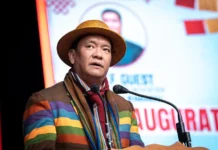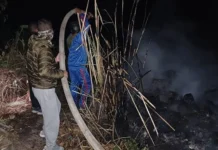[ Suraj Kumar ]
NEW DELHI, 29 Jul: The Supreme Court on Thursday pondered on whether to entertain a PIL which raises allegations of corruption regarding certain tenders floated by the Arunachal Pradesh government years ago at a belated stage.
The bench comprising Justices Aniruddha Bose and Justice Bela M Trivedi was hearing a special leave petition where the petitioners alleged that contracts were given by the state government without floating any tender. The former chief minister of the state and the beneficiary contractor were parties to the original SLP. An interlocutory application (IA) was also filed, impleading the present CM as respondent.
When the matter was taken, Justice Bose pointed out that there is a considerable time gap between the occurrence of the alleged incidents and the date of the hearing.
Advocate Prashant Bhushan, representing the petitioner’s organisation, Voluntary Arunachal Sena, responded by stating that he was seeking order regarding 165 contracts that were awarded without following proper tender procedures.
Justice Trivedi then raised concerns about delay, noting that these allegations were brought on record for the first time in 2019.
Bhushan posed a vital question to the court: “What is the duty of any court when presented with prima facie evidence of serious wrongdoing by a CM?”
Justice Trivedi questioned where the petitioner had been “if he was such a vigilante.” Bhushan informed the bench that the petitioner is an organisation of monks, and said that it has no vested interests. He reiterated the court’s duty in dealing with matters involving prima facie evidence of grave wrongdoing.
In response, Justice Trivedi said that the litigant’s responsibilities must be assessed first before getting into court’s duty.
“I am on a larger issue. Let’s assume the applicant is a crook/bogus. Now he has brought to the court evidence of actual contracts issued by the government of which
the CM is a minister to a company that belongs to him. The duty of the court is not to dismiss this fellow. Duty is to appoint amicus, discharge petitioner,” Bhushan urged.
Justice Bela Trivedi questioned, “That doesn’t mean you’ll come to the court at any time.”
He emphasised that in a PIL, the important thing is whether there is evidence of grave wrongdoing.
Justice Trivedi raised concern, asking, “Time gap has also to be seen? Let officers do some important work?”
He countered: “What can be more important than ex facie corruption? Without tender how can you award a contract?”
He further pointed out that there are established codes of conduct for ministers, which prohibit them from allowing their family members to be involved in government contracts.
Meanwhile, the counsel representing the state argued that the beneficiary of the contracts, as well as the former CM has passed away. “Therefore the SLP has abated against him.”
Advocate Prashant Bhushan pointed out that “so far as IA is concerned, facts are against the present CM. He owned a company and transferred it to his wife in 2012. 165 contracts were given without tender by the state government.”
He asserted that when the matter is of grave concern, IA can also be treated as a writ petition. When courts take up matters suo moto or letter petitions as PIL, the court’s powers are wide enough.
The bench asked: “Shouldn’t you go to HC?”
Bhushan submitted that “HC says it doesn’t matter whether the tender was issued or not. Four companies came forward and gave quotations. How did they comer forward? They were brought by CM. In this matter, we’ve filed the contracts. This is ex facie corruption case.”
Disturbing trend of PILs being withdrawn due to undue pressure in last 10 years, laments petitioner
Advocate Prashant Bhushan went on to allege that “for rice worth Rs 10 crore you spent Rs 69 crore in transportation?”
“My conscience is aroused, and the court’s conscience should also be aroused. The state’s finances are being plundered,” he emphasised.
Drawing attention to a disturbing trend in PILs over the last 10 years, advocate Prashant Bhushan expressed concern that petitions with evidence of grave wrongdoing are often withdrawn due to external pressures or technicalities.
He firmly argued that, in cases where evidence of wrongdoing has been presented, an amicus should be appointed, and a thorough investigation should be appointed, and a thorough investigation should be conducted against the sitting CM. He urged the court not to get lost in technicalities but to address the gravity of the allegations.
He further emphasised that the court is entitled to treat the IA as a writ petition (WP) in cases of serious concern.
He submitted that “we’ve come up with irrefutable documents against the present CM. His increase in income is phenomenal- he’s the second richest CM in the country.”
Justice Bose posed the question “whether these expenditures are audited or not.”
Senior advocate Vikas Singh (appearing for present CM-respondent) submitted that it’s done by state departments also.
Bhushan promptly suggested that the CAG or any independent agency outside the state should conduct the audit, citing the CM’s influence over state agencies as a potential conflict of interest.
Writ courts cannot entertain PIL for CBI inquiry when statutory remedies are available contended: Singh
In defence of the CM, senior advocate Vikas Singh referred to two judgments that emphasised that writ courts could not entertain PILs for (CBI) inquiries when alternative statutory remedies are available. He argued that the onus of launching an investigation lies with the police, magistrate, or CBI, and that the courts should not pass directions in writs for such matters.
While relying on the observations in the judgment, he asserted that the initiation of investigations lies exclusively within the domain of the executive branch of the government. He emphasised that courts should only play a corrective role, stepping in when there are issues with ongoing investigations, threats, or obstruction of evidence.
He argued that the petitioner must approach the appropriate investigating agency with incriminating material and follow the statutory remedies available before seeking court intervention.
Merely because Mr Bhushan says so, everyone be considered a thief in this country?: Singh
Sr advocate Vikas Singh contended that non-disclosure of the credential of the petitioner discredits the petition. The writ courts cannot take cognisance based on generalised allegations.
He submitted that these are mere allegations and half-baked truth presented by the petitioners.
He remarked that “Mr Bhushan says I am now standing here. He’s not even gone to Arunachal Pradesh. He’s fighting somebody else’s case. He did tot even go to vigilance. He straight away came to this court here.”
He lashed out at the petitioners’ allegation, saying that “Merely because Mr Bhushan says so, everybody should be considered a thief in this country?”
With reference to the award of contract, Justice Bose questioned “What is the principle on which it is done?”
He responded that in every case tender is given. He also pointed out that there was an exigency in this case.
Justice Bose inquired: “Is there any file noting?”
He submitted that “All that is noticed by HC.”
Advocate Prashant Bhushan interjected, asserting that it was an admitted fact before the HC that no tender had been issued in this case.
Sr advocate Vikas Singh pointed out the exigent situation he mentioned earlier. He submitted that there was a flood and in a natural calamity relief is needed. In that context, some action has to be taken. “What happened in Delhi during floods? Should we wait and go for tender? Till that time people should suffer? He’s in fact saying that people should die,” Singh said.
Justice Bose intervened, clarifying that Bhushan’s statement did not imply that people should face suffering or death. Rather, he raised the issue of awarding contracts without following proper tendering procedures.
Advocate Bhushan responded that even the central government in its response filed earlier had said that in Arunachal Pradesh, tender is not followed in remote areas. He contended that even the HC does not say the tender was floated.
Sr advocate Vikas Singh reiterated that the established law required going through proper processes and seeking redressal from authorities before approaching the writ court. He cited similar cases involving allegations against CMs in Sikkim and Jharkhand, where the court had advised approaching the authority first.
Furthermore, he pointed out that the contractor involved in the original matter has passed away, and there are no allegations against the present CM. He asserted that the IA could not be entertained without substantial grounds against the current CM.
Then Justice Bose called on for respondent appearing for the state.
The counsel representing the state referred to specific findings from the high court, suggesting that the writ petitions were motivated. The passage of time since the initial filing was also cited, questioning the credibility of the allegations.
Justice Bose raised concerns about corruption, to which senior advocate Vikas Singh clarified that they were not advocating to sweep corruption under the carpet but advocating for the right path to address the matter.
Justice Bose observed, “We’re on laying down that path.”
Only HC and SC can order CBI to look into such cases contended petitioner
Bhushan cited the court’s precedent, stating that magistrates hold no power in matters involving CBI investigations under Section 156 (3), CrPC. At the same time, the CBI could not initiate an investigation without the consent of the respective states involved.
He further argued that a party cannot request a CBI investigation independently. He also questioned the practicality of approaching local police when allegations of corruption by CMs are involved.
According to him, only the high court and the Supreme Court possess the authority to order a CBI or any other investigating ag-ency to look into such cases.
The court scheduled further hearings for directions in four weeks and in the meanwhile asked advocate Prashant Bhushan to submit a short note of his compilation for assisting the court. (This reproduced report was first published in Live Law. Read original report



